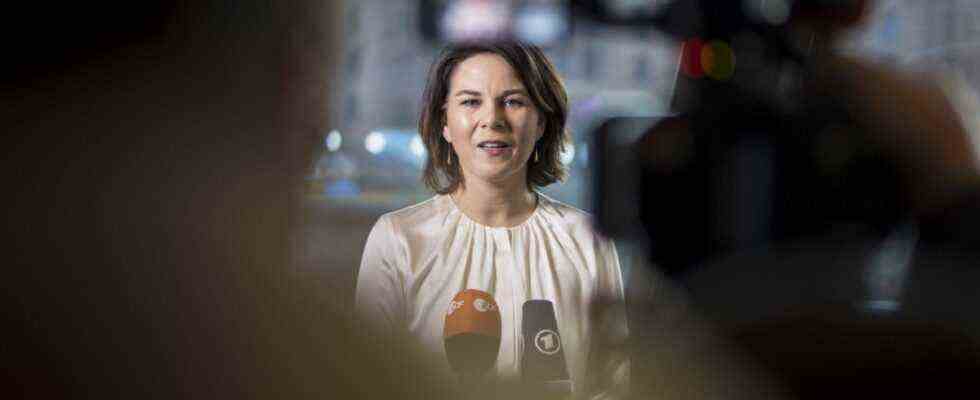Inaugural visits are usually courtesy appointments and serve to get to know each other and exchange views on the “entire range of bilateral issues”. But if Federal Foreign Minister Annalena Baerbock first travels to Ukraine on Monday and then from Kiev to Moscow in the evening, there will be no room for niceties – especially since Russia’s Foreign Minister Sergey Lavrov is not known for always treating his guests with care.
The Green politician arrives amid the worst crisis between the two successor states of the Soviet Union since Russia’s annexation of Crimea in 2014. With Russian calls for the end of all NATO expansion and a withdrawal of the alliance from Eastern Europe, the security order in Europe is at stake .
Meanwhile, Kiev fears another invasion, this time possibly a much larger one. President Volodymyr Zelensky’s government has clear expectations that Berlin will do more to protect Ukraine’s territorial integrity and sovereignty. Weapons deliveries and new sanctions against Moscow are among the demands.
Above all, distrust is fueled by the German government’s adherence to the controversial Russian gas pipeline Nord Stream 2. Kiev sees it as a purely geopolitical project by the Kremlin in order to avoid transit through Ukraine – and thus have a free hand in the neighboring country. Statements by Chancellor Olaf Scholz (SPD) that it was a “private-sector project” caused irritation.
They go back to statements made by ex-Chancellor Angela Merkel (CDU), who at least admitted that “political factors” had to be taken into account. Kiev is happy to accept the pledges from Berlin to help Ukraine build up the production of green hydrogen. Politically, however, they are seen as a consolation or tranquilizer.
Baerbock is likely to receive more encouragement at the meeting with Selensky and Foreign Minister Dmytro Kuleba for efforts by Germany and France to revive the so-called Normandy format, in which the Minsk agreements between Kiev and Moscow were negotiated in 2015 with the mediation of Paris and Berlin. They envisage a ceasefire in eastern Ukraine and outline the path to a political solution to the conflict. However, both sides accuse each other of not fulfilling their obligations.
It is said that Zelenskiy is very interested in a summit meeting with Putin. However, he also discussed a three-way meeting with US President Joe Biden. From the point of view of France and Germany, a prerequisite for a Normandy summit would be substantial progress. Jens Plötner, Chancellor Scholz’s foreign and security policy adviser, and his French colleague Emmanuel Bonne held preparatory talks in Kiev and Moscow. Deputy government spokeswoman Christiane Hoffmann said on Friday in Berlin that there was “cautious optimism” that a meeting of four at the level of advisors could soon be possible.
Lavrov was already a UN ambassador when Baerbock was still at school
Baerbock will have to advertise primarily in Moscow. In Berlin, after last week’s marathon of talks, there is at least a general willingness on the part of the Russian side to talk, even if the march on the border with Ukraine continues and members of the government publicly doubt the point of further meetings with the West. They are counting on Putin to keep his options open and that nothing has been decided yet.
However, the last attempt by France and Germany to revive the Normandy format ended with Foreign Minister Lavrov having the confidential diplomatic correspondence on the subject posted on the Internet – a gross violation of diplomatic conventions. Now, after six weeks in office, Baerbock is meeting one of the longest-serving and most accomplished diplomats in the world. Lavrov was already an ambassador to the UN when she was still in school. It is the Foreign Minister’s baptism of fire.
Age and government experience, however, are no guarantee that Mr. Njet will not present you. For example, when EU foreign policy chief Josep Borrell appeared in front of the cameras with Lavrov last year, the Kremlin had just made public the expulsion of three diplomats from EU countries. In the press conference, the offended Spaniard then failed to decisively counter Lavrov’s allegations.
Baerbock’s predecessor Heiko Maas also approached Lavrov, who, however, contradicted. In Moscow, it was noticed that Maas took a more critical stance than might have been expected of a social democrat. No doubt Baerbock’s statements on how to deal with authoritarian states like Russia, her formula of “dialogue and toughness”, were also registered. The latter is a discipline that Lavrov has mastered like no other.

